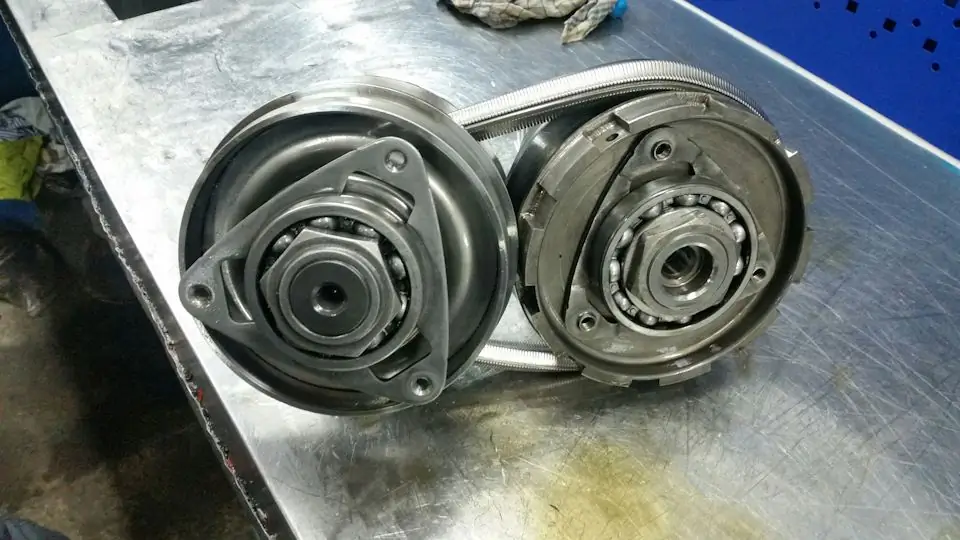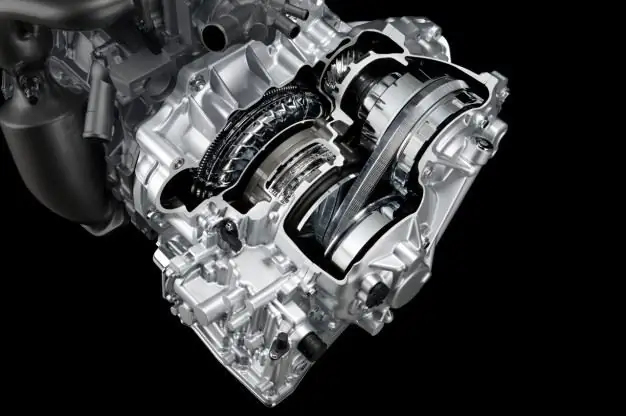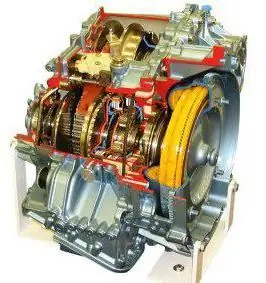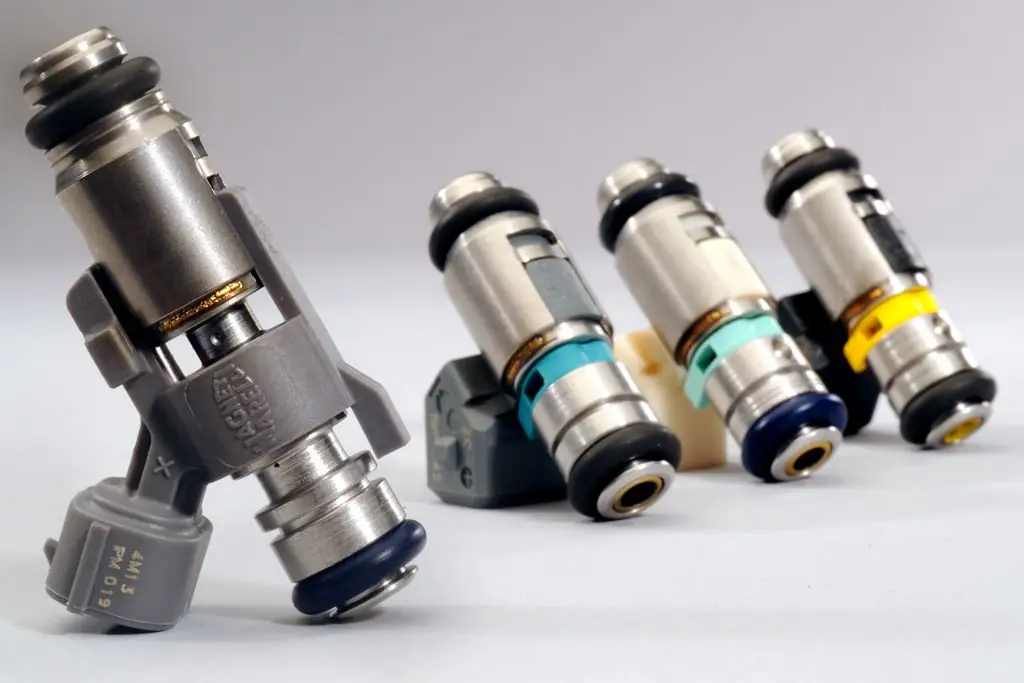2026 Author: Erin Ralphs | [email protected]. Last modified: 2025-01-22 21:14:12
When choosing a vehicle for many car owners, one of the main criteria is the type of transmission. One of the most advanced is considered a variator, reviews of which, design features, characteristics and other nuances are given below.
CVT Features
A feature of the variator that distinguishes it from other types of gearboxes - both manual and automatic - is the absence of fixed gears. For each such unit, the transmission force, or number, is in a certain range at a particular moment in time and under certain conditions. This is possible due to the fact that the operation of the variator is based on a different principle than other gearboxes.

The principle of operation of the variator
The principle of operation of the variator is to transfer force from the drive shaft to the driven shaft through a belt drive. In modern cars, a chain or a metal belt acts as a belt drive, the engine is the drive shaft, and the wheels are the driven shaft. A smooth change in the gear ratio is ensured by an equally smooth change in the diameter of the driven and driving shaft. To ensure thisprocess using special techniques. Every modern automaker has developments in this area: for example, according to reviews, the Mitsubishi variator has the smoothest ride.
All CVTs are divided into two main categories depending on the type of transmission.
V-belt CVTs
V-belt transmission is based on a trapezoidal toothed belt, which is represented by many car manufacturers as a belt made of metal plates or a chain. The second component is two pulleys assembled from conical disks. Changing the value of torque and speed occurs due to a change in the diameter of the pulleys.

The principle of operation of the V-belt variator
The drive pulley, after pressing the accelerator pedal, transmits rotation from the engine to the driven shaft. It is designed in such a way that under the influence of centrifugal forces with an increase in speed, the cheeks of the disks are compressed, as a result of which the drive belt is pushed to the edge of the pulley from its center. In this case, the reverse process occurs on the driven shaft: the cheeks are unclenched, which leads to the belt shifting to the center of the pulley. Thus, there is a smooth change in effort and gear ratio. Releasing the accelerator pedal reverses the process.
Toroid variator
The principle of operation of the toroidal variator is somewhat different and comes from its design: the shafts in it are replaced by wheels with a spherical surface, between which the rollers are clamped. One of these wheels is driving, the second,respectively, driven. A change in the friction force between the rollers and wheels provokes a change in the gear ratio and the value of the transmitted torque. The gear ratio changes as a result of changing the position of the rollers in the transverse plane. The angular velocity of the driving and driven wheels is the same if the roller is horizontal. The change in gear ratio occurs when the position of the rollers changes.
Toroidal variators are used extremely rarely, which is associated with complex manufacturing technologies and design solutions. V-belt devices are the most popular in the automotive industry today: they are used by many auto concerns - judging by the reviews, Nissan CVTs are of this type.

CVT oils
CVT oils are appropriately labeled - CVT - and are very different from other transmission fluids. Such compounds not only lubricate rubbing surfaces, but also prevent slippage. The use of a belt to transmit torque between the shafts is only possible due to this property of the oil. In the reviews of the variators, it is noted that it is impossible to allow oil starvation due to this feature, otherwise you may encounter slippage of the chain along the working surfaces of the shafts, which will lead to their rapid wear.

Variator benefits
Owners in the reviews of CVTs note the following advantages:
- Smooth movement. The car accelerates without jerks, which are typical for other gearboxes. The ride is like riding an electric lift or an electric car.
- High efficiency. The transfer time of useful power from the engine to the transmission is significantly reduced due to the high efficiency. In the reviews of the CVTs, an increase in the dynamics of the car during acceleration is noted, which is especially felt at speeds of 50-60 km / h and above.
- Fuel economy. A smooth acceleration and the same smooth braking, coupled with high efficiency, provide significant fuel savings.
- Sustainability. Less fuel consumption and therefore less CO2 into the atmosphere make the car more environmentally friendly.
- Gentle operation. In reviews of the variator, owners note reduced wear of parts and an increase in their working life due to the fact that the operating conditions are selected by electronics in such a way that the device and the engine operate in a gentle mode.

Disadvantages of the variator
Despite the fact that the CVT is considered a perfect gearbox, it also has its drawbacks:
- It is impossible to install such a device on cars with a powerful engine - more than 220 horsepower. Many automakers - Nissan, Toyota - in their reviews of CVTs note this and conditioned by the fact that too much force is exerted on the CVT roller or its drive belt in powerful engines.
- Expensive gear oil. Owners of many foreign cars - for example,"Nissans" with a variator - in the reviews they note the too high price of gear oil and the pickiness of the assembly itself to the quality of the lubricant. For this reason, you only need to purchase original oil from official dealers, which are many times more expensive than their budget counterparts.
- High probability of failure due to the large number of sensors and electronics in the CVT control system. Quite often, Nissan X Trail CVTs suffer from this. In the reviews, the owners of such foreign cars note that in case of a minor breakdown, the variator switches to emergency mode or turns off completely.
- Difficulty in carrying out repairs. The cost of repairing a variator is several times higher than that of automatic transmissions and manual transmissions, in addition, repairs are complicated by the search for car services specializing in such work. For example, the owners of Nissan X Trail with a CVT in their reviews indicate that in the event of a gearbox breakdown, they will have to contact an official dealer.
- It is impossible to tow other vehicles or trailers on a car with a variator, as well as the car itself with the engine and variator turned off. In reviews of the Qashqai with a CVT and other cars with a similar gearbox, car owners note that the only exception is the situation when the drive axle is hung out.

Results
Despite all the shortcomings, CVTs today are the perfect type of transmission. In reviews of "Qashqai" with a variator and many other cars with this type of transmissioncar owners appreciated all the advantages of their use. Manufacturers are constantly improving the design of CVTs, so we can say that in the next few years they will displace manual and automatic transmissions from the automotive markets.
When buying and operating a car with a CVT, you need to consider several nuances:
- This type of transmission does not accept aggressive driving style.
- Prolonged driving at extremely low or high speed on the CVT is not recommended.
- It is necessary to operate the variator at low or high temperature in special conditions.
- Towing a car with a CVT and the engine off is not allowed. An exception is the situation in which towing is carried out with the drive axle suspended. In addition, it is also prohibited to tow other vehicles and trailers with a CVT vehicle.
- Shock loads on the CVT drive belt are contraindicated, so it is better to ride on flat tracks.
- Replacing the drive belt and gear oil should be carried out in a timely manner.

Before purchasing a car with a CVT, it is necessary to prepare in advance for the conditions of its operation, especially if the car owner has previously used an automatic or manual transmission. The only requirement is timely maintenance of the variator and regular replacement of consumables - transmission oil and drive belt.
Recommended:
HBO variator: what is it and why is it needed? Ignition timing variator

HBO variator: design, specifications, features, pros and cons. What is the ignition timing variator for? Gas equipment for a car: description, photo, installation nuances, operation, maintenance, safety
CVT transmission: principle of operation, owner reviews on the pros and cons of the variator

When buying a car (especially a new one), many motorists face the question of choosing a gearbox. And if everything is more or less clear with engines (diesel or gasoline), then the choice of transmissions is simply huge. These are mechanics, automatic, tiptronic and robot. Each of them works in its own way and has its own design features
The principle of operation of the variator. Variator: device and principle of operation

The beginning of the creation of variable programs was laid in the last century. Even then, a Dutch engineer mounted it on a vehicle. After such mechanisms were used on industrial machines
Do-it-yourself Nissan X-Trail variator repair: description, technology and reviews

The CVT transmission on the Nissan X-Trail has been the subject of controversy among motorists for many years. Someone drives his car, only undergoing scheduled maintenance, and someone has become a frequent visitor to the service station and dreams of getting rid of a constantly breaking car as soon as possible. Why is this happening? When does a Nissan X-Trail CVT repair become a necessity?
Carburetor and injector: difference, similarities, advantages and disadvantages of carburetor and injection engines, principle of operation and expert reviews

For more than a hundred years, the car has firmly established itself in our lives. During this time, managed to become a familiar, everyday means of transportation. Let's see what the difference is between a carburetor and an injector, what advantages and disadvantages they have

